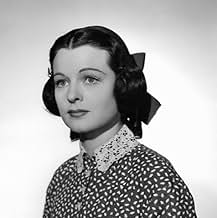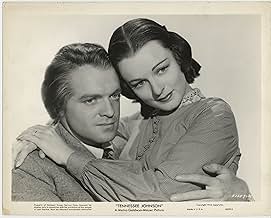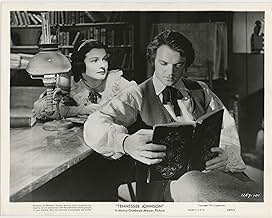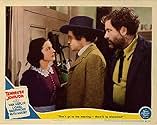Biography of Andrew Johnson, who followed Abraham Lincoln into office and became the first President of the United States ever to be impeached.Biography of Andrew Johnson, who followed Abraham Lincoln into office and became the first President of the United States ever to be impeached.Biography of Andrew Johnson, who followed Abraham Lincoln into office and became the first President of the United States ever to be impeached.
- Sheriff Cass
- (as Noah Beery Sr.)
Featured reviews
As his adversary in the impeachment process, LIONEL BARRYMORE delivers another one of his more restrained performances without overdoing the ham. He and Heflin share some pretty dramatically effective moments, both of them in fine form. Heflin takes the character of Johnson from his humble beginnings as a tailor to his marriage to Hussey and his gradual emergence as a spokesmen for the people of Tennessee. For the sake of running time, it skips most of the years leading up to the Civil War and Lincoln's assassination, compressing all of those events and managing to keep the screenplay a tightly knit focus on the impeachment process itself. Only quibble is it fails to make clear the strongest point of the impeachment.
VAN HEFLIN plays most of his role in appropriate age make-up (as does Hussey) and they're both terrific. In lesser roles, MARJORIE MAIN, REGIS TOOMEY and CHARLES DINGLE provide colorful support.
Summing up: May not be a complete history lesson, but it will certainly cause viewers to probe more deeply into the detailed background of historical interest. And it does serve to remind us what a fine actor Van Heflin was in a demanding role.
The accepted historical view of Andrew Johnson's presidency now is that had he been a bit more of a politician and also had been able to rise above the prejudices of his poor white class, the whole impeachment would never have happened. His actions through the use of the presidential veto in stalling the Reconstruction set racial equality in the USA aside for a century. Men of good will on both sides had they been willing to give a little might have settled on a compromise Reconstruction policy without all the rancor that characterized it and U.S. politics for decades.
The real story is Andy Johnson's rise to the presidency. As is showed here young Johnson arrives in Tennessee escaping a kind of slavery of his own. He was an indentured servant to a tailor and learned the trade, but after differences with his employer in his native North Carolina, Johnson escapes to Tennessee.
Andrew Johnson is the only United States president who never spent one day inside a school classroom. He was taught to read and write by the woman who later became Mrs. Johnson. There's was a real love story, one of the most romantic in our history.
Johnson's real moment of courage was after a slow rise up the political ladder that saw him elected as Mayor of Greenville, Tennessee, the state legislature, the House of Representatives, governor and then senator from Tennessee. In 1861 he was the only southern Senator to not walk out of the Senate when the south seceded. He became military governor of Tennessee when the Union Army captured enough of it to set up a government. Johnson's very life was in peril every minute from the firing on Fort Sumter to Lee's surrender at Appomattox. That's a story worth telling.
Unfortunately Johnson represented the poor white class in Tennessee and saw freed slaves as a rival labor force. He had all the prejudices of his class and wasn't hesitant to voice them. That part of the story is not told in Tennessee Johnson.
I did like Charles Dingle's performance as Senator Waters, why he wasn't given his real name in history of that of Ben Wade of Ohio is beyond me. As President Pro Tempore of the Senate with no sitting Vice President, he was first in line of succession had Johnson been impeached. From what I know of Ben Wade, Dingle fitted the role well.
Though it made good cinema, Andrew Johnson never addressed the Senate personally during his impeachment trial. There was an ill Senator who cast a deciding vote that saved Johnson's presidency. But unlike William Farnum's character of Senator Valley, James Grimes of Iowa had been felled by a stroke and no one expected him to be in the Senate that day. But he was carried in and voted not guilty.
The real story of Andrew Johnson is one of the most dramatic about one who turned out to be one of our worst presidents. Too bad it wasn't told in Tennessee Johnson.
Johnson was illiterate, until his wife taught him to read and write. He educated himself, and rose in the legal and political world of Tennessee (and then the nation). But he was a piece of "po' white trash", and remained so with all it's cultural baggage. He supported the North because he (rightly) distrusted the Southern plantation aristocracy (epitomized by Jefferson Davis). However - he hated slaves and free Black people. Hence his willingness to be soft on the South. Lincoln would have been soft too, but Lincoln had great gifts at managing his adversaries and probably could have arranged a compromise. Johnson was pig-headed. He antagonized the Radical Republicans controlling Congress. They waited for him to make a mistake, and he did (technically he violated the Tenure of Office Act, by firing Secretary of War Stanton without getting Congressional permission - this act was declared unconstitutional in the 1880s). Then followed his impeachment and the saving of his skin by seven Republican Senators who voted not to remove him. And those men all lost their Senatorial seats.
In 1943 Johnson was considered a hero, for saving the Executive Branch from becoming a rubber stamp for Congress. Actually, there was nothing to show that some Radical Republican President could not have restored power to the Executive Branch if Johnson had been removed. He gets high grades for his grit and courage, but his pig-headed stupidity and racism sink his historical rating.
Still Van Heflin, Lionel Barrymore, and the other actors (like Charles Dingle) make the film interesting and enjoyable enough. Good film making but mixed history. Two final points: Edmond Ross was in good health when he voted, but James W. Grimes of Iowa also voted for acquittal, and he had a paralytic stroke a few weeks earlier (he died within a year). Second: Andrew Johnson is the second Vice President of the name Johnson (and Lyndon Johnson the third Veep). The first was Martin Van Buren's Vice President, Richard Mentor Johnson of Kentucky, whose career as a politician might make a diverting comedy.
There, we meet film subject Van Heflin (as Andrew "Andy" Johnson), in a leg iron. The future President is a runaway apprentice (between free-man and slave, but significantly closer to free). Bound to a tailor, Mr. Heflin has learned the profession and goes about mending figurative fences with local townsfolk. He learns to read and write from attractive Ruth Hussey (as Eliza McCardle), who becomes Heflin's first lady. Reading "The Bill of Rights" gets Heflin interested in expanding US Constitutional rights to include non-property owning "white trash" like himself...
Becoming successful in politics, Heflin's Johnson goes against the Southern grain by supporting some of Abraham Lincoln's platform; they both want to keep the Union whole. After the Civil War, President Lincoln selects Johnson as his Vice-President to help heal war wounds and assist in Reconstruction. Johnson has problems after succession to the top office. Yes, there are "dramatic liberties" (lies, even) taken, as the opening states. Heflin is fine, and makes Johnson a sympathetic character. Lionel Barrymore (as Thaddeus "Tadd" Stevens) and popular "silent" film star William Farnum (as Senator Huyler) have pivotal roles.
****** Tennessee Johnson (12/42) William Dieterle ~ Van Heflin, Lionel Barrymore, Ruth Hussey, William Farnum
Did you know
- TriviaThere was a protest from some sectors that the film distorted the life of Thaddeus Stevens (who initiated the impeachment proceedings against President Andrew Johnson). Additional filming occurred in October 1942, but it is not known if it was because of these protests. One line in the script (Stevens referring to Lincoln as "the old ape") was eliminated. Still, the film treats Johnson much more favorably than it does Stevens.
- GoofsA key scene in the film depicts Johnson entering the Senate while it is debating his impeachment and removal from office, and making a major speech there in his defense. In reality, the actual President Johnson, despite his desire to confront his enemies in the Senate, never once entered or addressed that body during his impeachment trial.
- Quotes
Jefferson Davis: I must pronounce our solemn farewell. Under these circumstances, of course, my functions - and those of my colleagues - terminate here. We but tread in the path of our fathers when we proclaim our independence - and take the hazard, putting our trust in God, and in our own firm hearts - and strong arms - we will vindicate the right as best we may.
[looking slowly around the room]
Jefferson Davis: I see now around me some with whom I have served long; there have been points of collision. For whatever offense I have given, I ask forgiveness. Of whatever of offense there has been to me, I leave here. I carry with me no hostile remembrance. I go hence unencumbered of the remembrance of injury received, and having discharged the duty of making the only reparation in my power for any injury offered.
[pausing]
Jefferson Davis: Mr. President; Senators - having made the announcement which the occasion seemed to me to require - it remains only for my colleagues and myself to bid you a final - adieu.
- Crazy creditsThe opening outline includes a disclaimer about historical facts being changed for entertainment purposes.
- ConnectionsReferenced in Sheldon Hall on Omar Khayyam (2023)
- SoundtracksThe Battle Cry of Freedom
(1862)
Written by George Frederick Root
In the score during the foreword, reprised in the score for the last scene
Details
- Release date
- Country of origin
- Language
- Also known as
- The Man on America's Conscience
- Filming locations
- Production company
- See more company credits at IMDbPro
- Runtime1 hour 43 minutes
- Color
- Aspect ratio
- 1.37 : 1
Contribute to this page







































